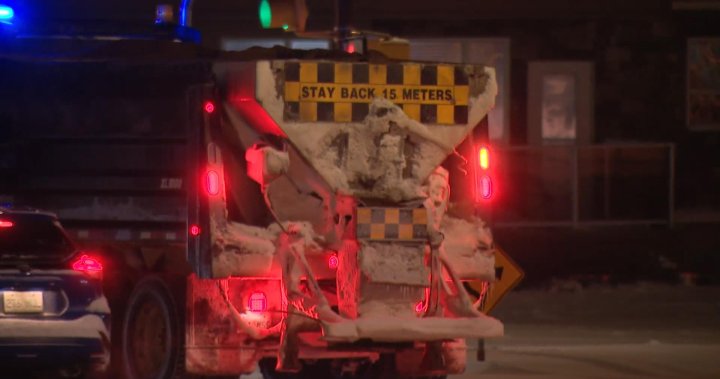For many Winnipeg motorists, it’s been a while since they’ve seen gas prices dip this low.
Most stations in the city are hovering around $1.15 a litre. Some welcome this discount at the pumps, but climate activists say the money could be put to better use.
The provincial fuel tax holiday came into effect Jan. 1, giving drivers a discount for the next six months.
The NDP promised the tax break during their election campaign. Finance Minister Adrien Sala said, “This is a measure that will help them to reduce their cost of living at a difficult time when a lot of Manitobans are facing those affordability challenges.”
He said the province is able absorb the 14-cent-per-litre loss.
According to the province’s supplement to the 2023-24 second quarter report, the average one-vehicle household will save $125 over six months. That’s about $21 per month.
The total cost to the province for the six-month break is $163 million.
Full-time courier with Red River Messenger Courier Inc., Brian McCarthy, welcomes the discount. “That’s $30 savings per day, you do the math on that. It’s nice,” he said.
“It’s good for the customer as well. The end user will pay less.”
Get the latest National news.
Sent to your email, every day.
Gabriel Duscharme said it will help with the high cost of living for his family up north. “I’m really glad that they’re not going to be spending an arm and a leg to get all the way to Winnipeg.”
Some who don’t own a vehicle say they likely won’t notice a difference, like Holly Alexandra who said, “Public transit is where we should shuffle around some tax dollars, I think.”
Alexandra expressed concern over the recent hike in transit fare from $3.15 to $3.25, but also for the lack of rural public transit.
Brent Bellamy, Winnipeg architect and architecture and city building columnist for the Winnipeg Free Press, chipped into the conversation on X, formerly known as Twitter. He said the tax break “will cost the government the same amount of money as offering free public transit in Winnipeg, Brandon, Thompson, Selkirk and Flin Flon, for almost two years.”
Bethany Daman, communications manager for Manitoba’s Climate Action Team (CAT) has similar concerns about the accessibility of the tax holiday.
“There’s not a one-size-fits-all solution for everybody, which I think that we’re seeing, even as they were going through the various steps to implement the gas tax,” she said.
Daman said that the slash also incentivizes fossil fuel use when it should be discouraged.
“It’s extremely important that we’re not pitting climate against affordability, because the reality is that any decisions that we’re making regarding affordability need to look at the long-term effects of emissions and climate action,” she said.
“The more we emit, we are seeing increased extreme weather events. We are seeing flooding, heatwaves, we’re seeing tornadoes, we’re seeing droughts. We’re seeing things that are causing significant affordability challenges for everyday Manitobans, for insurance companies, for governments.”
She wants to see more funding in areas that would reduce dependence on gas instead of a six-month break.
“We absolutely acknowledge that right now systems are not in place for everybody in Manitoba to just, cold turkey, stop using fossil fuels. But the incredible thing is that solutions exist to do just that.”
Daman said, “Making transit more accessible and more affordable for people, making it safer,” is a part of the solution. She noted Manitoba’s CAT compiled dozens of solutions specific to the province in a “Road to Resilience Pathway.”
The pathway looks at helping buildings operate more efficiently, fuel switching, and energy storage.
She said she urges decision makers to “look at current affordability as well as long-term affordability,” and to generate affordability for everyone by using “a more holistic approach to transportation rather than just a one-off, (with) something that is going to benefit only people who own a vehicle.”
Manitoba Minister of Finance Adrien Sala said he couldn’t comment on how Manitobans without a vehicle would see savings from the initiative, but said the province will reassess the holiday at the end of the six-month period.
Premier Wab Kinew said the government’s budget — which will come out in spring — will “put forward some good policy measures to chart a path towards net-zero for our province. That’s going to use incentives and offering people help on the affordability front to make those changes.”
— with files from Global’s Iris Dyck
© 2024 Global News, a division of Corus Entertainment Inc.



